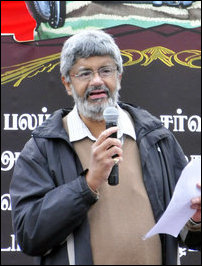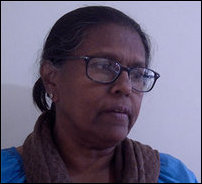by Dr. N. Malathy, TamilNet, August 18, 2024

Mr. Viraj Mendis from International Human Rights Association, Bremen, Germany at Pongku Thamizh, Geneva, 2011
The “radicalness” observable in Eelam Tamil Nationalist struggle ranges from centre-right all the way to radical left. It was only the launch of armed struggle that saw radical-left politics entering the Tamil Nationalist struggle. Prior to that Tamil radical politics was led by the Communist party centred on anti-caste movement. Armed struggle was partially successful in absorbing the anti-caste struggle but there were many elements in the anti-caste struggle that stood apart and watched the armed struggle with a very critical eye.
Viraj Mendis who had a very long history in radical politics from his very young student days is a key personality in bringing out the radical left element in the Tamil armed struggle. Eelam Tamils from the radical left will remember him for his contribution in this regard which ranges from leading protests against refugee deportation to organizing the Permanent Peoples Tribunals on Sri Lanka that passed verdicts of Genocide against Sri Lanka and complicity in Genocide against Britain and the USA.
I first met Viraj in 2010 at the Dublin tribunal but did not have much chance to interact with him. I met him again in Bremen at the second Tribunal. Again opportunity for interaction was limited. He invited me to Germany again for an activist meeting in 2014 and it was from this time on that I had extensive interactions with him in person and over the internet. His ability to interpret political events in the radical left perspective is unique. I always regretted that he did not write down his thoughts. So much insight just went unnoticed I thought.
One comment Viraj made to me comes to mind. He was reflecting on the Tamil diaspora, which despite facing a brutal genocide is resisting to turn to radical left politics. His explanation ran thus. The diaspora is like a huge ship sailing smoothly with its own belief systems. Expecting it to turn to radical left politics is like asking it to jump onto a small boat in the massive ocean!!

Dr. N. Malathy
Viraj left the island as a 17 year old to study in the UK. Though he was later deported back to Sri Lanka, he soon gained asylum in Bremen, Germany. As such he had not lived for long periods among his fellow Sinhala people. I too left my home community at the age of 18 and never went back to live there for long periods. Is it possible that we both lacked an in-depth knowledge of our respective communities due to this. Even now, I struggle to understand my community and I have also not heard Viraj comment on his community.
I also wish to note here a document Viraj sent me many years ago and told me not to share with anyone because it was incomplete. I strongly believe this document must be put in the public domain because it charts the historical details of the geopolitical interest of the British colonial power in the island. In the document it says many Sinhala activists worked on it for many years to gather the details. [Editor’s note: The document will be published after clarification from the authors].
The unique soul that Viraj was, who would put himself through all kinds of hardship to get justice for others, will undoubtedly rest in peace for having done his best in this life.
Chronology:
Rest in Peace